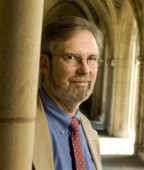This last week I (RJS – not Scot) have spent my commute listening to the audio from the Wheaton Theology Conference: Jesus, Paul and the People of God: A Theological Dialogue with N.T. Wright. This is fascinating stuff – I highly recommend it. This next week or so I am going to take a break from issues of science and faith and put up a couple of posts in dialogue with the speakers at the conference (no I don’t expect them to join in, but we can have a conversation anyway).
This conference was a celebration of the scholarly work of N. T. Wright through a combination of laud and criticism – for there is no greater honor than that which takes the work and thinking of another seriously and interacts with it honestly and deeply.

The opening talk of the conference was given by Richard Hays, Knowing Jesus: Story, History, and the Question of
Truth. In this talk Hays relates an incident that he calls “the blow-up in Boston” where Wright was rather colorfully, but vehemently, critical of a book Hays had edited (Seeking the Identity of Jesus: A Pilgrimage). Hays goes on to discuss the reasons in light of Wright’s work, with emphasis on where, perhaps, Wright has gone wrong, the losses in his work – and especially in Jesus and the Victory of God. A great talk…
In the middle of the talk – before getting into the losses – Hays gives what he sees as five gains in Wright’s eloquent, wide ranging, and cohesive construction of Jesus (time in: 23:15 – 28:30). To quote/paraphrase: Wright gives us a Jesus who Jesus fits intelligibly into the history of Israel in the first century under Roman rule. He recovers the of political and pragmatic character of the gospel, the Kingdom of God. He gives a positive coherence of the synoptic storyline with the old testament and Israel where Jesus is the culmination of God’s astonishing cosmic plan to restore his covenant people and to bring salvation to the whole world. He recovers a high Christology where Jesus was conscious of a vocation to enact in himself what in Israel’s scriptures God had promised to accomplish all by himself. He provides a historical account of Jesus that “might have apologetic value and impact.”
Wait a minute … might have apologetic value and impact? … said with a touch of dismissive doubt? … here I hit pause and resolved to post on this paper. Hayes doesn’t get it – he doesn’t understand why, in my opinion at least, Wright has the impact he has – why his work is important for the church, and not just for the guild of NT scholars.
Has Wright’s work (esp. his scholarly work) had an impact on your faith or church?
Does it have apologetic value and impact?
Here is the full quote from Hays’s lecture (27:04-28:30):
Fifth, and finally on the gain side, from a theological point of
view one might hope, and I think Tom does hope, that his historical
account of Jesus might have apologetic value and impact. He seeks to
give us a historical narrative that takes in all the evidence and shows
that the gospels actually do give us a persuasive coherent picture of
what really happened in the life of Jesus. … To the extent that Tom’s construction works as secular
history it creates a bridge for dialogue with nonbelievers about Jesus.
They can be invited to cross the bridge and come and see who Jesus was
without first having to surrender completely their own historical
conciousness and world view. I fear that this apologetic hope is
illusory or at least exaggerated. But it may be the case that Tom’s book
really does serve a slightly different sort of apologetic function, as
indeed so much apologetics does, it’s not a sign for nonbelievers but
for believers. It may allow uncertain believers to gain greater
confidence about the historical credibility of a story that they already
haltingly believe on other grounds.
Wright’s work – the entirety of the three big books (The New Testament and the People of God, Jesus
and the Victory of God, and The Resurrection of the Son of God), and much of the rest of his work as well, does exactly what Hays allows that “it may.” But it does more than Hays allows, and the significance is far greater.
In our Colleges and Universities today many undergraduate students find
their faith tested, often severely. Within the graduate and postdoctoral
ranks in secular academia strain and tension is almost unavoidable -??
in all areas of scholarship and study. Ben Meyer reflects, in the
introduction to Ch. 5 of The Aims of Jesus, that in the course of debates on faith and history (and we could broaden this to faith and intellectual
pursuits in general) we see or have seen four responses to the conflict: (1) Faith requires the renunciation of intelligence. (2) Intellectual integrity requires the renunciation of faith. (3) By the skin of one’??s teeth one can hold to both faith
and integrity. (But within this position there is a constant tension. We bracket off the questions and continue to function – barely. Many stories -?? both of those who “lost faith” and those who “retained faith” include this approach in the mix.) (4) Intellectual integrity demands faith.(A modernistic “evidence that demands a verdict” approach.)
As a scientist I found another aspect to the discussion as well. The general approach of the church, the evangelical church at least, to science is indefensible. It works to an extent within an enclosed conclave with well defended walls, but not in the wider world. Given the obvious problems in this realm, a serious question looms, menacing. Is there any reason to think that biblical studies in general and the foundations of our faith in particular is any different?
Hays estimation may apply – uncertain believer …
haltingly believing on other grounds. But this is a rather insulting turn of phrase – and undervalues the depth of the problem.

So what is the value of Wright’s work on Jesus? He takes an approach rooted in critical realism, uses hypothesis and verification, faces the evidence head on, and he puts forth a coherent and cohesive picture of Jesus and his mission. No evangelical group thinking allowed. No skirting the issues, no truth by assertion, no trumping confession. Jesus fits intelligibly into the history of Israel in the first century under Roman rule. Jesus is the culmination of God’s astonishing cosmic plan to restore his covenant people and to bring salvation to the whole world. We have a fully human Jesus who acted with purpose intent on a mission. We don’t have an otherworldly Jesus with miracles tacked on to prove divinity. We don’t have a set of random bits and pieces.
What Wright’s work does — and not Wright alone, there are other thinkers and scholars who follow in similar vein — is to add a fifth possibility to Meyer’s taxonomy: (5) Intellectual integrity is fully compatible with faith but
requires honest interaction. We cannot separate the Jesus of history from the Jesus of the church.
Don’t underestimate the power of the apologetic. As an autobiographical note, in my adult journey I have moved from 2 to 3 in Meyer’s taxonomy, with a long holding pattern in 3. Wright showed me a way to move on to 5 – no individual thing was more transformative than reading his three big books.
This doesn’t mean, of course, that
Wright has given us the last word. Hayes has valid criticisms of
Wright’s work – as does Marianne Meye Thompson in the second talk. A certain group of scholars may require the rejection of John, but faith with intellectual integrity does not. And we should pay attention to the literary and theological shape of the individual gospels. I learned a great deal from both of these talks – and from the others as well.
What do you think? What are the gains from Wright’s work? Is there an apologetic value?
(The three big books are a bit much – 1876 pp total – but The Challenge of Jesus: Rediscovering Who Jesus Was and Is and the book with Marcus Borg The Meaning of Jesus: Two Visions provide an excellent start and make good books for small groups and University ministries. My suggestion: Every college ministry should read through The
Challenge of Jesus on a regular cycle every several years.)
If you wish to contact me you may do so at rjs4mail[at]att.net

